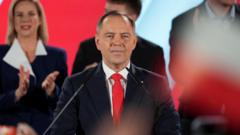Right-wing candidate and historian Karol Nawrocki has been declared Poland’s new president after a narrow victory, defeating liberal mayor Rafal Trzaskowski amid a dramatic turnaround from pre-election polling.
Karol Nawrocki Wins Polish Presidency in Narrow Election Victory

Karol Nawrocki Wins Polish Presidency in Narrow Election Victory
Poland elects historian Karol Nawrocki in a tightly contested presidential race.
In a remarkable electoral outcome, Karol Nawrocki has succeeded in becoming the new president of Poland, capturing 50.9% of the vote according to the state electoral commission (PKW). This puts him just ahead of Warsaw's liberal mayor Rafal Trzaskowski, who secured 49.1%. The results reflect a dramatic shift from the first exit polls that indicated Trzaskowski winning with 50.3% to Nawrocki's 49.7%.
While addressing his supporters, Trzaskowski initially claimed victory based on the early exit poll results, coining the term “razor's edge” to describe the intense race. "We won, although the phrase 'razor's edge' will forever enter the Polish language and politics," he stated, while his wife humorously remarked about the tension of the night. Nawrocki, however, remained hopeful early on, stating, "Let’s not lose hope for this night. I believe that we will wake up tomorrow with President Karol Nawrocki."
Nawrocki's election is poised to enhance the influence of the opposition party, Law and Justice (PiS), which is rejuvenated by the presidency after losing power in the past 18 months. He is anticipated to utilize the presidential veto power to obstruct the pro-European Union initiatives introduced by Prime Minister Donald Tusk. Nawrocki’s political alignments echo traditional Catholic and family values, alongside a commitment to Polish sovereignty within the EU.
Although Poland's presidency is largely ceremonial, it grants Nawrocki the authority to veto legislation, a tool he might wield to counteract Tusk's coalition government's agenda, which lacks the parliamentary majority needed for overruling a veto. While both candidates show support for continued assistance to Ukraine amidst its conflict with Russia, they diverge in their visions for Poland's relationship with the EU. Trzaskowski advocates for Poland to assume a central role in European affairs, whereas Nawrocki maintains a more nationalistic stance, resisting further delegation of powers to the EU.
At 42, Nawrocki emerged onto the national stage after being selected as the unofficial candidate by PiS, where his image as a physically active individual helps resonate with voters. However, his campaign faced scrutiny regarding his property ownership, leading to controversy over his promised care for a pensioner from whom he acquired an apartment. Eventually, Nawrocki committed to donating his flat to charity, attempting to mitigate any backlash from voters.
This election marks a significant moment in Poland’s political landscape, with implications extending into future elections and national policies as the country navigates its position in Europe amidst evolving dynamics.
While addressing his supporters, Trzaskowski initially claimed victory based on the early exit poll results, coining the term “razor's edge” to describe the intense race. "We won, although the phrase 'razor's edge' will forever enter the Polish language and politics," he stated, while his wife humorously remarked about the tension of the night. Nawrocki, however, remained hopeful early on, stating, "Let’s not lose hope for this night. I believe that we will wake up tomorrow with President Karol Nawrocki."
Nawrocki's election is poised to enhance the influence of the opposition party, Law and Justice (PiS), which is rejuvenated by the presidency after losing power in the past 18 months. He is anticipated to utilize the presidential veto power to obstruct the pro-European Union initiatives introduced by Prime Minister Donald Tusk. Nawrocki’s political alignments echo traditional Catholic and family values, alongside a commitment to Polish sovereignty within the EU.
Although Poland's presidency is largely ceremonial, it grants Nawrocki the authority to veto legislation, a tool he might wield to counteract Tusk's coalition government's agenda, which lacks the parliamentary majority needed for overruling a veto. While both candidates show support for continued assistance to Ukraine amidst its conflict with Russia, they diverge in their visions for Poland's relationship with the EU. Trzaskowski advocates for Poland to assume a central role in European affairs, whereas Nawrocki maintains a more nationalistic stance, resisting further delegation of powers to the EU.
At 42, Nawrocki emerged onto the national stage after being selected as the unofficial candidate by PiS, where his image as a physically active individual helps resonate with voters. However, his campaign faced scrutiny regarding his property ownership, leading to controversy over his promised care for a pensioner from whom he acquired an apartment. Eventually, Nawrocki committed to donating his flat to charity, attempting to mitigate any backlash from voters.
This election marks a significant moment in Poland’s political landscape, with implications extending into future elections and national policies as the country navigates its position in Europe amidst evolving dynamics.





















